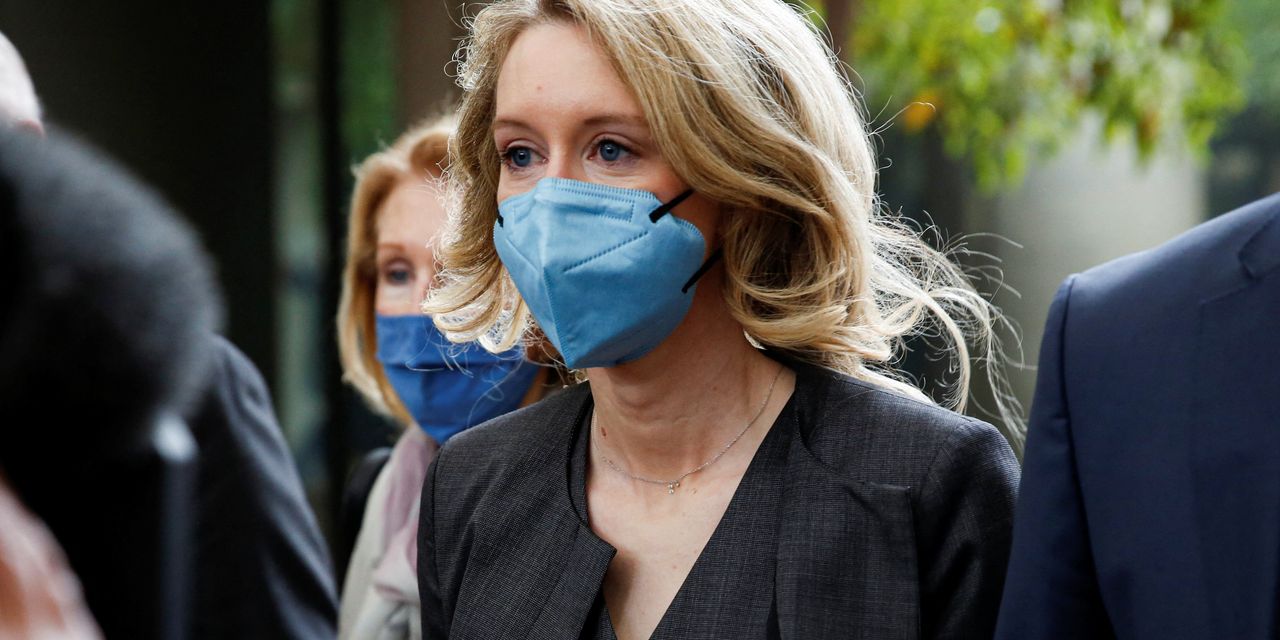
SAN JOSE, Calif.—A federal judge instructed jurors in the criminal-fraud trial of Elizabeth Holmes to continue deliberating after they said they were unable to reach a unanimous verdict on three of the 11 charges against the Theranos Inc. founder.
After 46 hours of deliberations over nearly seven days, jurors were stuck on three counts, according to a note read by the judge in court Monday morning. The note suggested they may have reached a unanimous verdict on the remaining eight.
The note marked a crucial update from the jury of eight men and four women since it was handed the case Dec. 17. After consultation with lawyers on both sides, U.S. District Judge Edward Davila instructed the jurors to keep deliberating and reminded them of the instructions they must follow to make their decision and that the prosecution has the burden to prove Ms. Holmes’s guilt beyond a reasonable doubt.
“Take as much time as you need to discuss things. There is no hurry,” said Judge Davila, reading aloud an “Allen charge” or a “dynamite charge” used to help deadlocked juries reach a verdict. He then sent the 12 jurors back to continue deliberating, telling them to notify the court if they had more questions.
Lawyers who are following the trial said Allen charges were typically effective in leading to a verdict, and that it was impossible to know which side the jury was favoring based on the note alone. “It could indicate they may be coming back with a compromise verdict,” said Michele Hagan, a trial consultant unconnected to the proceeding who was in court Monday.
Even if the jury remains deadlocked on the three counts, it still can return a unanimous verdict on the other eight. If any of those eight include a guilty verdict, Ms. Holmes would face a possible prison sentence, determined by the judge. Each fraud charge carries a maximum sentence of 20 years in prison plus fines and restitution.
Ms. Holmes hugged her mother and partner, Billy Evans, after the jurors left the courtroom.
Jurors are deliberating on 11 counts of wire fraud and conspiracy to commit wire fraud, in which Ms. Holmes is accused of intentionally misleading investors and the public about the capabilities of Theranos’s blood-testing technology. The charges include two counts of conspiracy to commit wire fraud, six counts of wire fraud related to investors who sank hundreds of millions of dollars into the company and three counts of wire fraud related to patients who said they received inaccurate blood test results.
Her defense lawyers told the judge they preferred he not read the Allen charge, saying it risked being coercive to the jury. Prosecutors supported the judge instructing the jury to continue deliberations.
“This was a long trial, both sides have interest in resolution one way or the other on all of the counts,” Assistant U.S. Attorney Robert Leach said. Opening statements in the trial were Sept. 8, and testimony took three months.
Kevin Downey, an attorney for Ms. Holmes, argued that instructing the jury to continue deliberating “runs the risk of coercion.” He said the note “reflects that they were capable of distinguishing between counts” and didn’t need further pointers.
“They’ve been at it over a very long period of time,” he added.
Judge Davila asked the two sides when it would be appropriate for him to declare a mistrial on the three counts the jury disagrees on if nothing changes after further deliberations. The parties agreed they needed to wait and see what the jury does next.
The jurors have been relatively quiet since before Christmas. On Dec. 21, they asked if they could take home the 38 pages of jury instructions to further study them. Judge Davila declined that request, saying all deliberations must stay inside a designated courthouse room.
On Dec. 23, the jury asked to hear again audio clips from a recorded phone call Ms. Holmes had in December 2013 with investors, which was part of the prosecution’s evidence. Lawyers replayed those 10 clips to the jurors, who kept their heads down and took notes.
By a certain point—which may have already come—the jurors “have reviewed and discussed all the evidence, and it becomes a matter of convincing holdouts to come over to the majority’s side,” Andrey Spektor, a former federal prosecutor in New York and now a defense lawyer who has been following the case, said in an email.
Write to Heather Somerville at [email protected] and Sara Randazzo at [email protected]
Copyright ©2022 Dow Jones & Company, Inc. All Rights Reserved. 87990cbe856818d5eddac44c7b1cdeb8








